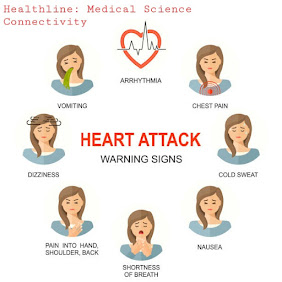 |
| Heart Attack patient |
Overview of Heart Attack in Women
Mostly heart attack occurs when arteries carrying oxygenated blood to heart muscle get blocked. The blockage of coronary arteries occurs mostly due to fatty deposits or plaques. Blockage of oxygenated blood to heart muscle causes damage to heart muscles leading to stop heart pump.
The most common signs and symptoms of attack is chest pain or discomfort which may travel into the shoulder, arm back neck or jaw. Chest pain often occurs in the center or left side of the chest and lasts for more than a few minutes. Heart attack is also known as myocardial infarction in clinical language.
The risk of heart disease is increasing rapidly worldwide. Men are more likely than women to have a heart attack, which is completely wrong. In addition, we hear that men have heart attacks after the age of 40 and women after the age of 45. But, there is no age for heart attack. Whether it's 25 years old or 45, anyone can have a heart attack. In United States, at every 40 seconds one person has a heart attack.
One of the major symptoms of a heart attack is chest pain, but according to a recent research report from the Cleveland Clinic Medical Center in the United States, there are many symptoms of a heart attack that are seen in women.
Let's discuss warning signs and symptoms of Heart Attack in Women
Sign and symptoms connected heart attack are not same in all people. Some people have mild pain while others have more severe pain . Some people have no symptoms. Some have sudden cardiac arrest.
Some heart attacks strike suddenly, but in most of cases people have warming signs and symptoms hours, days or weeks in advance. These warning signs and symptoms might be recurrent chest pain or chest pressure angina or chest discomfort.
Chest Pain or Chest Discomfort
Uncomfortable pressure, deep pain, tightness in the centre or left side of the chest is a main warning signs of heart attack. The pains spread to neck, jaws or back of body and it last within few minutes and may come back again.
Dizziness and shortness of breath
Dizziness and difficulty breathing are common symptoms of a heart attack. However, according to the latest reports, dizziness is also considered a common symptom in women. Therefore, it is important to be cautious.
Discomfort upper areas of the body
Heartburn in chest and pain and discomfort in one or both arms, the back, neck, jaw or stomach are another signs and symptoms connected heart attack.
Cold Sweating
Cold sweating is a normal process of sweating. But women have been found to have cold sweats many times during heart attacks. If you have a cold sweat, it is important to contact a doctor immediately.
Feeling very tired / Fatigue
Person has relaxed a lot but she is constantly feeling tired and she doesn't even feel that she can get up and walk 10 steps, it can also be a symptom of a heart attack.
Note if any sign or symptoms have seen in you body you should visit to doctor as soon as possible
 |
| Heart Attack symptoms |
Heart attack risk factors
There are certain factors that contribute heart attacks in people. Although we cannot escape from some factors like age, gene factor, we can eliminate or reduce some factors effect in our body. Reduction or elimination of such factors reduces the chance of heart attack.
Heart attack factors are age, high blood pressure, tobacco, high blood cholesterol, obesity, diabetes, metabolic syndrome, family history of heart attacks, stress, lack of physical activity, illicit drug use, history of preeclampsia, and autoimmune condition
Prevention of heart attack
Although we can't completely prevent heart, we can reduce the chance of heart attack by applying certain medical measures. These measures are :
Medications :
Taking medicine at right time can reduce the chance of heart attack and save the heart muscle from being damaged. Person with possible heart attack should continue to take what doctor prescribes
Lifestyle :
You know that your life styles always determine your health status. So everyone should maintain healthy weight with heart healthy diet to reduce the probability of heart attack. Don't smoke, do exercise regularly, manage stress, keep control over blood pressure, blood cholesterol levels and diabetes to prevent possible heart attack









